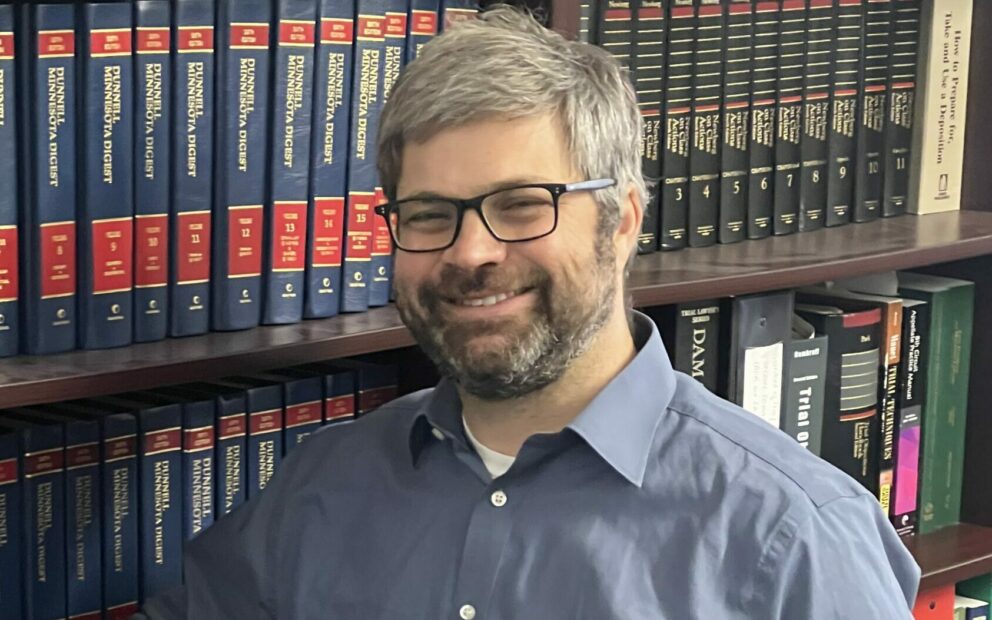Attorney’s record of wins creates ripple effects for justice

It was a Craigslist ad that caught Attorney Steve Schmidt’s eye. This was after college and before law school. “This was before Indeed and LinkedIn,” he says with a laugh.
Steve, a political science and Spanish major, had just graduated from the University of Wisconsin-Madison. Weighing his options, he seriously considered a post with Teach for America. “I was accepted into the program and would be teaching Spanish for two years.” A great opportunity for Steve, who honed his bilingual skills studying in Ecuador his junior year. “But then I saw the ad posted by Legal Aid in Chicago.” Intrigued, that’s the job he took.
Inspired after helping people with social security and disability appeals, he headed to the University of Minnesota for law school. While there, he clerked with Mid-Minnesota Legal Aid in 2009. J.D. in hand, he accepted a state district court clerkship in Owatonna, Minnesota; then returned to MMLA as a staff attorney with the Minnesota Disability Law Center in 2012, making impact after impact.
Colleagues couldn’t agree more. Eren Sutherland, who worked with Steve on the landmark Murphy v. Harpstead case, says, “His clients trust him. He has a very calming presence and a very clear communication style.” Patient and persistent are also apt descriptions, as Murphy took nearly seven years from start to finish, ultimately ensuring residents with disabilities in group homes could get to choose where they live.
Curb ramps
With an approach to work that’s understated, low-key and sharply focused, Steve doesn’t often think in terms of the impact he’s made. But when asked to reflect, he recalls examples he’s proud of. At the center of one is something we see almost every day — curb ramps. Ever wonder why some sidewalk corners have them and some don’t? “It is a ‘mill and overlay,’ a type of street repair,” Steve says.
“Adhering to the Americans with Disabilities Act, the law says when doing street repairs, you have to update and install curb ramps.”
The ramps, or curb cuts, as some call them, are slanted gradations, helping people in wheelchairs get from the sidewalk to the street level so they can cross.
Next time you see newer sidewalks in St. Paul with curb cuts, think of Steve, MDLC and community-minded folks concerned for vulnerable people with disabilities.
If curbs don’t have them, they likely were poured before the ADA required them, or perhaps city planners chose to ignore the law. That was almost the case in St. Paul, before disability activists worked with Steve.
“The city was resistant until we got to the brink of suing them. As a result, they found the $1 million necessary to do the work.” Next time you see newer sidewalks in St. Paul with curb cuts, think of Steve, MDLC and community-minded folks concerned for vulnerable people with disabilities.
Stiripentol
Some victories start in litigation and evolve to an impactful change in law. This was the case, Steve says, when “We had a young client who had Dravet syndrome.” Dravet causes seizures in young children. The drug offering relief, Stiripentol, was not FDA approved and was not covered under Medicaid. “However, under a provision of Medicaid law known as the Early Period Screening Diagnosis and Treatment (EPSDT) benefit,” Steve says, “coverage for the drug could be authorized without FDA approval.” Schmidt sued to get the family coverage. “The Department of Human Services settled that case pretty quickly and agreed to authorize coverage.”
But it didn’t end there. As Steve says, this was an occasion when Legal Aid and policy intertwined. “I got to work with policy wizard Anne Henry,” a longtime expert in disability law at Legal Aid, “to get the law changed. This ensured other children, not just our client, could get the drug covered under Medicaid.” Eventually, the drug got FDA approval.
Prisoner rights
Steve acknowledges that it’s easy to gain support for children in vulnerable circumstances, but people sometimes forget that incarcerated clients are vulnerable, too, deserving of representation. “I had a client in prison who had the rare blood disease Phenylketonuria, or PKU.” PKU is life-threatening and requires a strict diet. “Our client’s blood levels were way off because the federal prison wasn’t getting him the right diet.”
After exhausting administrative remedies and filing an initial lawsuit in federal court, we negotiated a settlement to get him significant improvements in his special diet.”
Personal Care Assistants
Some people with disabilities need help with the activities of daily living — things like getting out of bed, bathing, dressing. To get time with a Personal Care Assistant to help with these activities, PCA service authorization is acquired based on these needs. One need is eating food. But, Steve says, “We found people were not getting credit for the help they need with cutting their food. Those, who were conducting PCA assessments for service time, maintained that cutting food was only part of the food preparation process, and therefore no service time should be awarded. We said, ’no,’ and took the matter to state district court. The judge agreed, saying, ‘Cutting food is essential to the daily activity of eating.’”
That was a victory for our client in 2016 and in 2024, as well. Steve says just a few weeks ago another DLC attorney had a similar case. “We were able to use the district court decision in an administrative hearing to get the same credit for someone else.”
While he admits he does sometimes think of that job he passed up with Teach for America, Steve is certain he made the right choice pursuing a legal career. “I enjoy the work. It’s challenging. We win a lot more than we lose. And then there’s the policy, legislative part of it. We get to take on cases considering the impact they could have, making life better for clients and people we may never know.”

